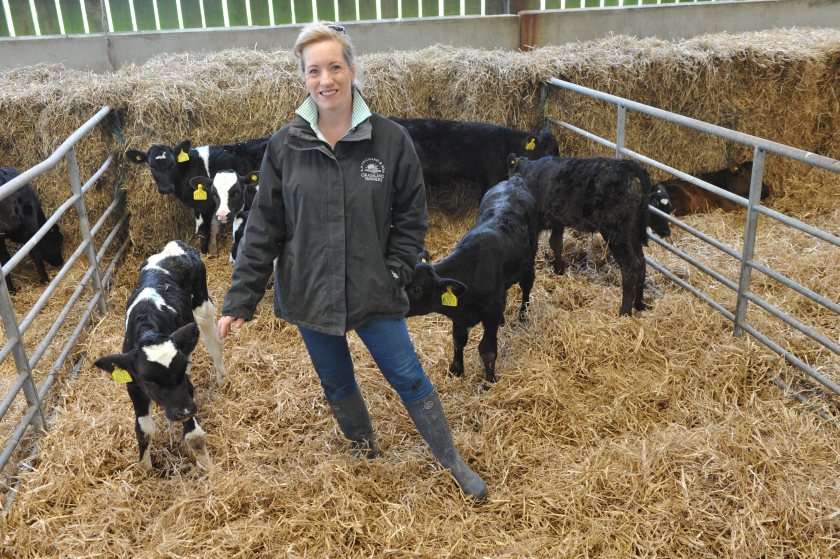
A Welsh spring-calving dairy farm is introducing a new feeding system for newborn calves in what is to be thought the first trial of its kind in a large-scale herd.
Will and Alex Prichard are feeding enriched pasteurised transition milk to calves in their first 10 days of life rather than abruptly transitioning them to whole milk or milk powder.
Research has shown that feeding transition milk to young calves vastly improves their digestive system’s ability to digest milk, with those benefits sustained to keep them healthy and thriving as they grow.
The Prichards, who produce milk from 500 spring calvers, were keen to trial this feeding system in their own herd at Escalwen, Pembrokeshire, in the hope of improving calf health and wellbeing.
They are doing this with support from the Farming Connect Try Out Fund, an initiative that funds individuals and groups of farmers to experiment with ideas.
Although the health benefits from enriched pasteurised transition milk have previously been demonstrated in all-year round calving herds in the US and Canada, it is believed to be the first time it has been trialled in a large-scale block calving herd.
Getting the correct nutrition is crucial in the early stages of a calf’s life. Even after a few hours the animal loses its ability to absorb antibodies – there is a dramatic reduction within 10 hours of birth and, by 20 hours, that capacity has all but gone.
To establish the effectiveness of the transition milk product, calves born at Escalwen this spring are being blood tested for antibody levels.
The transition milk is also being tested for its immunoglobulin (IgG) status before and after it has been pasteurised.
If it needs enriching this is being done to raise the BRIX value to a minimum of 12.5%. It is then fed to calves during their first 10 days of life.
An optical refractometer is being used to measure milk BRIX as it gives an instant result but by the end of the study all batches of transition milk will have been tested for IgG using Radial Immunodiffusion Assay at the University of Edinburgh.
Vet Dr Ryan Davies, director of Veterinary Technical Consulting, who is providing expert input into the project, says this will enable the accuracy of milk BRIX to be determined to quantify IgG status.
“We will then assess this against the health status of the calves," Dr Davies explains.
Mortality from neonatal calf diseases such as diarrhoea, pneumonia and navel and joint ill is being monitored and antibiotic use too, as well as daily liveweight gains - at birth, at 30-35 days and at weaning.
The project hopes to understand more about how dairy farmers with large block calving herds can consistently produce animals that are healthy, productive and have a good quality of life through optimising calf health with preventative healthcare.
More productive animals mean less carbon emissions, higher standards of animal welfare and a reduction in antibiotic usage.
Not only do Will and Alex hope to reap the benefits in their own system but that other farmers will too when the findings are shared with the industry at the end of the project.
"Having the ability to acquire extra resources at the busiest time of our year has allowed us to monitor the results of our actions in a more scientific fashion," says Will.
“Funding large scale testing is telling us so much about what is happening in our own herd environment and most importantly what behaviours and protocols are driving tangible improvements in herd health and antibiotic reduction."
They had already made big gains in improving calf health before this project got underway.
The five-year average for morbidity in their pre-weaned calves from 2018-2022 was 45%, in line with the national average of 47% - in 2023 it was reduced to 17%
Use of the Highest Priority Critically Important Antibiotics was reduced from 1.98mg/ population corrected unit (PCU) in 2022 to zero the following year.
